Takoyaki: The Savory Octopus Balls from Japan
Takoyaki is one of Japan’s most popular street foods. The ball-shaped, octopus-filled snack has come a long way since its invention in 1935, when Tomekichi Endo made the first batch on the streets of Osaka.
Back then, Mr. Endo opened the first takoyaki store in Japan, Aizuya, an establishment that still exists today. His initial recipe contained beef and konjac, but he soon switched to using octopus as a filling for flavored batter, a recipe that millions know and love today.
Tomekichi Endo may have started out as a humble street vendor; however, his breakthrough saw takoyaki spread from the Kansai region to the Kantō region and finally to the rest of Japan. After the 1930s, you could hardly find a yatai food stall that did not sell takoyaki.
Street food is still quite popular in Japan, with millions of people from all economic and social classes frequenting yatai and izakaya. Takoyaki happens to be one of the most popular dishes on the menu.
Tourists coming into the country are not left out. They love Japanese street food just as much, and many have taken their interest in takoyaki back home with them. It has even found its way into supermarkets, convenience stores, and specialty restaurants.
The rest of this post promises to explore the ingredients, variations, cultural significance, and culinary use of takoyaki within and outside of Japan. Let’s uncover why it's so special, shall we?
What is Takoyaki? Unraveling the Delicious Mystery
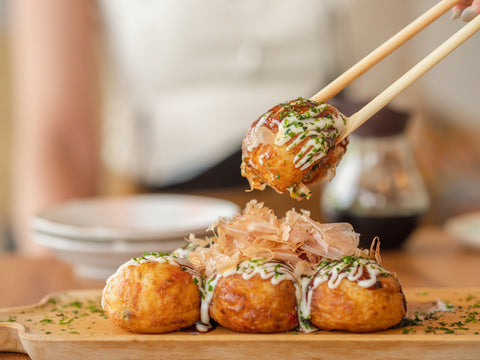
Takoyaki is a Japanese snack made of round balls of wheat-flour batter filled with small pieces of octopus. A typical takoyaki recipe will also contain fillings made from bits of tempura, green onion, and pickled ginger.
The name takoyaki is a combination of two Japanese terms: tako and yaki. Tako means "octopus,” and yaki refers to the traditional Japanese method of cooking over direct heat (frying or grilling). If you’re familiar with Japanese cuisine, you may recognize other “yakis,” such as okonomiyaki, sukiyaki, yakitori, and tamagoyaki. They have similar names because of their status as fried foods.
Below are the ingredients used to make classic takoyaki:
-
Flavored batter: Dashi (Japanese soup stock), regular wheat flour, eggs, soy sauce, and salt are all combined to make a special batter for takoyaki. An alternative is ready-made takoyaki mix.
-
Octopus: Takoyaki contains cooked octopus, which is obtainable as a whole from grocery stores.
-
Tempura scraps: These are also called tenkasu. They are crunchy, deep-fried bits of tempura.
-
Green onion: It’s also known as scallion and adds nutrients and a green color to the dish.
-
Pickled ginger: Beni shoga or pickled ginger, adds a spicy kick to takoyaki.
-
Takoyaki sauce: This special sauce is identical to Worcestershire sauce and is used for brushing the meal.
-
Mayonnaise: It combines well with takoyaki sauce.
-
Garnish toppings: You can top takoyaki with dried bonito flakes (katsuobushi) and green laver (aonori).
The above ingredients are common in traditional takoyaki. However, there are countless variations, especially with the types of fillings used, some of which do not contain octopus.
Takoyaki Variations: Exploring Regional and Innovative Twists

To showcase the versatility of the dish, here are various takoyaki variations found throughout Japan and innovative versions that have emerged globally. They serve as some of the best alternatives to octopus in takoyaki.
-
Crab cake: a combination of crab meat or crab stick and lettuce stuffed in dashi-flavored batter.
-
Bacon: mixing bacon and cheese for a simple filling alternative.
-
Peanut butter and chocolate: uses pancake batter and is filled with peanut butter and chocolate or cocoa powder.
-
Shrimp: chopped shrimp as a direct replacement for octopus meat in traditional takoyaki.
-
Curry: made with bits of potato and carrots in curry powder batter, topped with pickled ginger. If you would like to eat takoyaki with pickled ginger, we highly recommend that you use Wel-Pac Shredded Pickled Ginger.
-
Apple cinnamon: dices of fresh apples and some cinnamon sugar with honey as a topping. It also uses pancake batter.
-
Mentaiko: salted pollock roe used in place of octopus, with no changes to the traditional recipe.
Many takoyaki variants do not contain octopus. There’re a lot of food enthusiasts who believe the true essence of takoyaki is not in its filling but in its shape and cooking method. To maintain the traditional ball shape and cooking style, a lot of people rely on the takoyaki pan, which allows you to make the snack more easily. Hence, you can find variations filled with Western cuisine or coated in pancake batter being served at events, especially takoyaki parties.
Takoyaki Parties: Bringing Japanese Flavors to Social Gatherings
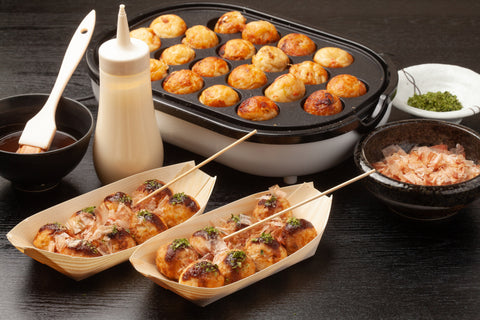
A takoyaki party or tako pa, is a traditional event popular in the Kansai region of Japan, particularly Osaka, where friends and family get together to cook and enjoy takoyaki. The concept behind the tako pa is for people to have fun while taking part in cooking different takoyaki variations. Takoyaki pans are commonplace here because of how easily they allow you to create balls of the snack in minutes.
If you hope to host a successful takoyaki party, the pan is a must-have at these events. You should also have a wide variety of unconventional ingredients to use as fillings for the takoyaki balls, such as cheese, mochi, ramen, chocolate, berries, nuts, and even wasabi. The available ingredients for the party should range from savory to sweet. This will ensure people of all ages can have fun making and eating these dishes.
A lot of Japanese people grew up attending these parties - especially those in Osaka, takoyaki’s birthplace. There, they learned to hone their cooking skills and to appreciate its impact on their native culture.
Takoyaki in Japanese Culture: More Than Just Food
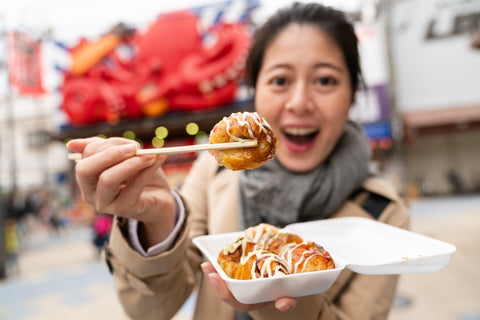
Like most “yaki” dishes, takoyaki embodies the Japanese culinary culture of fried or grilled snacks. The coming together of people to grill and share food is a significant gesture in Japan, which is evident in the popularity of takoyaki parties. Over the years, it has come to represent the creativity and passion associated with Osakan cooking.
Takoyaki also has a massive impact on Japanese street food culture. Together with other dishes like tempura and okonomiyaki, takoyaki is a favorite on the menus of the yatai and izakaya of Fukuoka, Tokyo, Kyoto, Osaka, and other places with a strong street food culture. Its popularity on the streets also makes it a common dish served during festivals.
References to takoyaki have even made their way to popular books, TV shows, and video games, most notably Takoyaki Mantoman, Brooklyn Nine-Nine, and Animal Crossing, respectively.
Where to Find Takoyaki: From Street Stalls to Your Kitchen

The best place to find authentic traditional takoyaki is at Japanese street stalls known as yatai. If you recall, it started out as a street food and has largely maintained that status over the decades. During festivals, you’ll find lots of people celebrating on the streets, and foods like takoyaki serve as fuel for the festivities. In countries like the United States, takoyaki has become common in specialty restaurants.
Feel free to go the homemade route and cook takoyaki in your kitchen. You can get all of the items you need from supermarkets and convenience stores, or order them online from Asian stores like Bokksu Market. Using these ingredients and mixes to make your own versions of takoyaki will unlock your creative side. However, if you can’t find the time, feel free to enjoy ready-to-eat packed versions of takoyaki. Shirakiku Takoyaki Japanese Octopus Balls are just as good as restaurant-grade takoyaki, even though they are premade snacks.
Crafting the Perfect Takoyaki Recipe at Home

Let’s help you make this savory snack in your home kitchen using the following readily available ingredients:
-
Coating: Wheat flour and dashi stock or dashi powder
-
Filling ingredients: octopus, tenkasu (tempura scraps), green onion, and beni shoga (red pickled ginger).
-
Toppings: takoyaki sauce, mayonnaise, katsuobushi (bonito flakes), and aonori (dried seaweed).
-
Other ingredients: baking soda, water, salt, neutral oil, and eggs.
You don’t have to comb through different stores in search of these items. Bokksu Market has most of the ingredients for making takoyaki. Get authentically Japanese products delivered to you with ease, no matter your location in the US. Now, back to our recipe.
Follow this guide to make traditional takoyaki at home:
-
Use a small pestle and mallet to grind the katsuobushi into a powder.
-
Slice the green onions into small pieces and mince the beni shoga.
-
Cut the octopus meat into bite-sized pieces.
-
Put some wheat flour in a large bowl, then add baking powder and salt to taste. Whisk the dry mixture.
-
Break open two eggs and pour their contents into the mixture. Add soy sauce and dashi stock and whisk thoroughly to get a thin and runny consistency. Add a little water if it gets too thick.
-
Transfer the batter mix to a cup with a spout and handle. You want something that allows you to pour the liquid mixture easily.
-
Place a takoyaki plate or pan over a medium flame and heat to 200ºC. Brush neutral oil over the surface.
-
Pour the batter into all of the wells of the pan. Make sure all of them are filled, even if there’s some overflow as a result.
-
Add one to three pieces of the octopus, then top with katsuobushi.
-
Sprinkle the garnishes (sliced green onion, tempura scraps, and chopped pickled red ginger).
-
Allow to cook for 3 minutes before using a chopstick or skewer in an L shape motion around the edges of each well. Push it down into the well and flip it to create an uneven ball that’s crispy on one side.
-
Flip again after 4 minutes and repeat the process for each well. Do this at 4-minute intervals until you get a round, crispy, and golden ball of batter in each well.
-
Transfer each takoyaki ball onto a plate and top them with a hearty drizzle of takoyaki sauce and mayonnaise. Sprinkle some katsuobushi and aonori on them to complete the dish.
The Essential Takoyaki Pan: Mastering the Art of Cooking
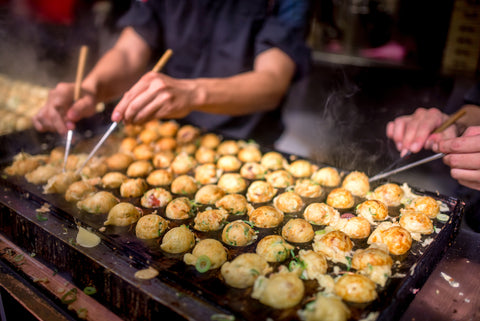
A takoyaki pan or takoyaki nabe, is a traditional Japanese hot plate used for making takoyaki. It’s a heavy cast iron griddle that evenly heats the batter balls by pulling the uncooked parts towards the base, helping the cook achieve the perfect round shape and crispy exterior of takoyaki.
You can find takoyaki pans during Japanese festivals or tako pa parties. Yatai street food vendors also use it to make snacks for their customers. Nowadays, it’s not uncommon to find households with takoyaki pans in their kitchens. If you get one for the first time, here are a few tips to help you use it:
-
Wash the entire pan with lukewarm water before and after you use it.
-
Heat it before and after using it to keep dough from sticking to it.
-
To store the takoyaki grill pan, dry it, apply a little oil to the wells, and wrap it all in newspaper.
In case you’re wondering - yes, you can make delicious takoyaki without the pan. Alternative utensils are a cake pop maker, egg rings, muffin tin, and aebleskiver pan. You can also buy one of the many electric takoyaki makers on the market today.
Takoyaki Sauce: The Secret to Authentic Flavor
Takoyaki sauce adds authentic umami flavors to takoyaki. It has a sweet and fruity taste that works well on a variety of dishes, such as pancakes, dumplings, and noodles.
You can create a homemade version of takoyaki sauce by mixing Worcestershire sauce, noodle soup base (mentsuyu), tomato sauce, and sugar.
If you’re unable to make the sauce yourself, buy Otafuku Okonomi Sauce. It brings the same tastiness and flavor complements to takoyaki.
The Role of Octopus in Takoyaki
Cooked and sliced octopus is the most important part of traditional takoyaki, which is why many call the dish octopus dumplings. It’s used as part of the filling for the dish, enlivening it with the taste of seafood.
Octopus with double rows of suckers have a higher quality than those with single rows. Get them to ensure the best takoyaki taste.
Garnishing Takoyaki: Bonito Flakes and More
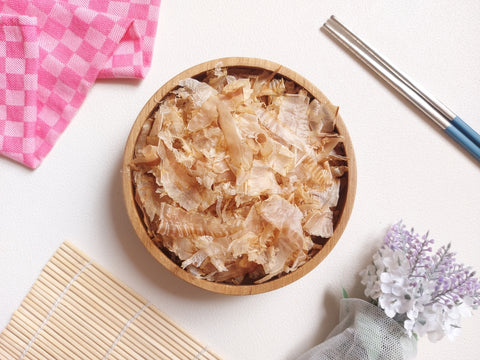
Garnishing your takoyaki will make the flavor richer, especially when you use traditional and popular ingredients like bonito flakes, mayonnaise, green onions, and dried green seaweed. You also need to top the snack with takoyaki sauce or tonkatsu sauce and Japanese mayonnaise. We’ve got you covered at Bokksu Market. Explore our site to find premium garnishes, including J-Basket bonito flakes and Kewpie Japanese mayonnaise.
Pairing Drinks with Takoyaki
Takoyaki is all about culinary creativity. Hence, you should never hesitate to enhance your dining experience by complementing the dish's rich flavors with beverages. Here’s a list of the best drinks to pair with takoyaki:
-
Sake: This is a Japanese rice wine. Its grassy note pairs well with the savory umami flavors of traditional takoyaki.
-
Highball: This is an alcoholic whiskey-soda drink that’s popular in Japan as a standalone drink and as a pairing for certain foods, including takoyaki.
-
Champagne:This may seem like an unusual pairing, but some restaurants serve takoyaki with champagne. Many of them reported positive reviews from customers.
-
Beer: Takoyaki sauce provides a salty taste that goes well with Japanese beer.
Takoyaki-Flavored Snacks: A Unique Taste Sensation
For those craving the taste of takoyaki in a convenient, on-the-go form, takoyaki-flavored snacks are the best option. They capture the essence of takoyaki’s unique taste and combine it with contemporary flavors to create tasty snacks such as takoyaki-flavored potato chips, crackers, and corn puffs.
Presently, the most popular takoyaki-flavored snack in the world is Calbee Takoyaki Ball Corn Puffs, thanks to its smart use of traditional recipes.
The Enduring Popularity of Takoyaki
It’s been nearly ten decades since the invention of takoyaki, yet people are still coming up with new recipes and fillings for the dish. The versatility, fun, and creativity attached to takoyaki will help to maintain its appeal for many years to come. For now, it remains a beloved snack in Japan, and its popularity continues to grow worldwide.
Author Bio








